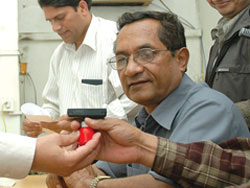|
|
| STAMP OF APPROVAL: Maoist central committee member Dinanath Sharma at the Election Commission as the CPN-M formally registers as a political party contesting elections. |
This time last year, the people's Spring Uprising was being met with intense suppression. One year down the line the ground reality has not changed much. We see the same brash behaviour of the political leadership, the bureaucracy, the private sector. In all areas where the ruling elite have their pervasive domain, things remain the same.
Nepali society did not transform itself. As in 1950 and in 1990, the knees of the political leadership buckled in 2006 and it all ended in a compromise. History has repeated itself.
When winds of change sweep through any revolution the old order must crumble to give way to an emergent force with total control to lead the new nation. This has not happened. How can we call it a revolution if the status quo persists? Just like the Mallik Commision, the Rayamajhi Commision has been shelved. Is the military really under government control?
Another spring, another sense of foreboding as the unrest in the tarai unfolds. Hill indigenous peoples are also restive. The interim constitution has been amended, but the unrest is intensifying. The political leadership is steering the nation towards another collision.
The spirit of the April Uprising had to do with the monarchy, not re-instatement of parliament. The people were misled by the political parties on the question of republic and constituent assembly and they merged ganatantra and sambidhan sabha to make them synonymous.
The constituent assembly is an elected body to draft a new constitution. The question of monarchy must be delinked from it and addressed by a referendum. The question of monarchy is not a debatable agenda, it is a choice decided by a 'yes' or 'no'. This right to choose should be taken directly to the people so that the constituent assembly can act on that decision.
If the question of monarchy is not decided prior to the constituent assembly elections, what issues will the political parties take to the people during the election campaign? It is obvious the bottomline will be whether to retain the monarchy or not. And that will be disastrous because the main issues of a new constitution will be on the back burner during the election campaigns. The election will be a de facto referendum on the monarchy and overshadow the main agenda of restructuring the nation.
The interim constitution has already been amended once to include federalism. A second amendment is being considered to accommodate the contending parties. It is not precise enough just to state 'federalism' but to categorically decide on the kind of federalism. The Election Commission has expressed doubts about the elections being held in the current timeframe. The international community seems to agree. Recent public opinion surveys prove most Nepalis do not know what the constituent assembly entails. The political parties themselves have not been able to take the issue to the grassroots.
The political parties are hell-bent on holding the constituent assembly by June because for them it is a face-saving way to appease the people. But it is pointless to conduct elections just for the sake of elections. The government should amend the interim constitution and call for a referendum on the question of monarchy in June instead of leaving the matter for the constituent assembly. This will allow the government to buy time to prepare for genuine elections while offering the people an alternative.
By sticking to the plan of holding the constituent assembly election in June, the parties could spark off another spring uprising. The political leadership should heed to wise counsel and not put the people through another sacrificial ordeal.
Maitalal Gurung is founding member of the Green Nepal Party (Hariyali).




